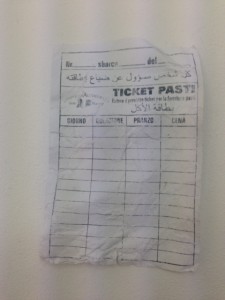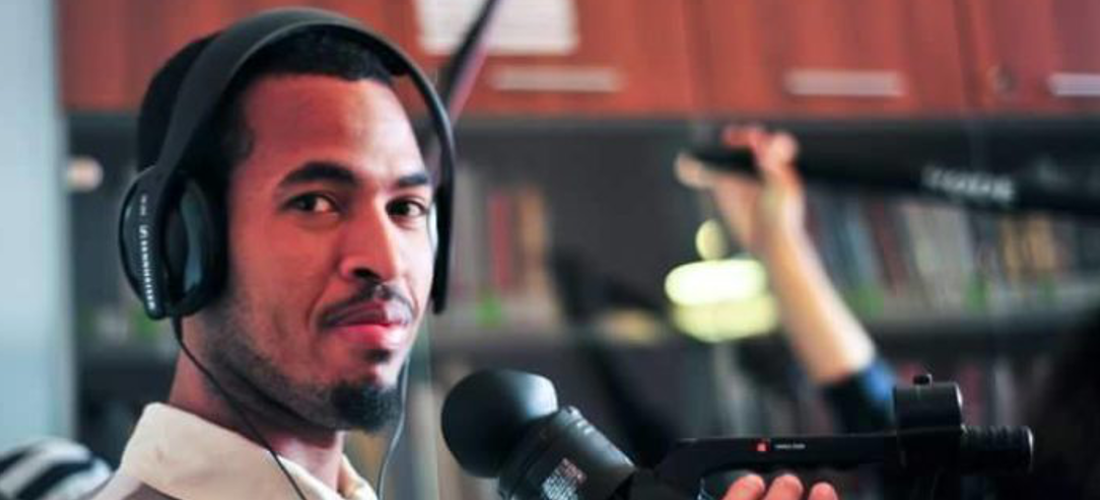Die Stadt Umdenken_Repenser la ville_
Ein Projekt des Virtuellen Partizipationslabors Postkoloniales Erbe
Autorin: Tania Mancheno
„To honour memory is a form of respect.“
Mancheno: During your stay in Hamburg last February as a guest speaker of the artistic project „Ort_M“ in Hamburg, you talked about a social requirement to rethink the museum in terms of place of history (as a space for remembrance), inasmuch as a current living space. You mentioned that museums need a change in the representation of national history.
To what extend does this change mean to abandon the idea we had about a museum until now? What does a museum mean for you today?

Zakarias Mohamed Ali © Desislava Valentinova Stoichkova
Ali: Since the time of my arrival in Europe, I have seen that museums are places where memory is kept. Memory can be transmitted through actual items or objects. Memory can also be stored and showed so that their meaning is not lost. These objects can be retrieved over the years and these may be placed in museum so as to help remembering, to raise awareness and to critically reflect on the memory. For me this place means a museum.
Mancheno: To what extent does the Archivio Memorie Migranti (Archive of Migrant Memory) propose new forms of representation and exhibition? What does the “new museum” represent?
Ali: Actually the archive does not propose a new Museum but a place where we can jointly share the memory of moments or places, which are relevant to the present. For our team, it is a matter of respect to a have a common place, where those who may want to know and remember the memory of the people, who have come to Lampedusa can do so. Those who have lost their memories, those who tomorrow may return to Lamepdusa as free men or women, and those for whom it should be the possibility of returning. This is our idea. There is no need to exploit objects and carry them around the world. These objects of memory belong to the thousands and thousands of peoples who have come here, to honour memory in a form of respect.
Mancheno: What is the value of a museum today? And who are, or should be the future visitors of the museum?
Ali: It depends on which kind of value we want to give our museum! There are museums of games, museum of martyrs, there are even museums of criminals, it depends on how people engage with these places. I am not judging anyone, I simply want to illustrate that today there are lots of places available for exhibitions: photographs, objects and documents are all of importance for today’s Museum. These are places to visit and to remember for the future of our children and our children’s children. We need museums as places, which guarantee respect, sharing and dignity and show that in the next 20 or 30 years, we will be citizens of a different Europe, one of multiculturalism, diversity, and creativity.

Zakarias Mohamed Ali, Hamed Diarra and Aluk Amiri at the Studio of the Archive for Migrant Memory in Rome © Desislava Valentinova Stoichkova
Mancheno: After your stay in Germany, do you see important differences in the approach towards the representation of migration in Hamburg and Lampedusa? If yes, what are some of the most important differences in the museological culture in each case? And if there are no important differences, what are the common denominators?
Ali: Lampedusa is an important place that differs from the rest of the world. It is a place, where it is important to safeguard one’s dignity. I do not agree with the current exploitations going on on the island, or how the authorities militarize Lampedusa. You cannot compare Lampedusa with other places. For us it is a place to start, to get a new life, it is not a border. Hamburg or Germany is after Lampedusa. I have seen in Lampedusa lots of activists and people who are very sensitive for real integration. I saw lots of images, writings, and graphic exhibits to represent. This is an advantage. Rome and many other places in Europe are not as active as Hamburg.
„We need places, which guarantee respect, sharing and dignity.“
Mancheno: In the last decades, the colonial legacy of the museum has become a topic, which is being discussed in Germany in the form of political activism, and in the form of academic research. The acquisition of art collections exhibited in European ethnological museums is still a contested issue.
In your opinion, what are the strategies for addressing this contested legacy from within the museum?

One of the objects shown in the Archive of migrant memories (AMM) is the ticket used for the transatlantic ferry. © Zakarias Mohamed Ali
Ali: I think that there are two different forms of activism. These are: political and social. Academic research is a form of social activism. The art and material collections concerning migrants in the last decades are very important for social and political activism. As a journalist and as an activist, I think that the acquisition of art collections is an important step for European history.
A museum should be a place of culture, a place of memory. A place, where there are more stories and more exhibitions. We require the diversification of representations and viewpoints. My opinion is that we should find other strategies to locate and share in such places. In the case of Lampedusa, an open, equally shared and inclusive museum is yet to be created. Europe needs a Museum, in which migration can be represented jointly and creatively. We don’t need precious works of art borrowed from other museums: we need to give more attention to local and migrant representations and dignity.
Mancheno: And last but not least, what could the museums in Hamburg learn from the experience you and your team have made in Lampedusa?
Ali: We have done some extraordinary work, we met the people of Lampedusa, we held meetings with the local associations, together with immigrants we proposed to make available these materials, we brought many other written records and video materials which should be made available to all. The Archive of Migrant Memories (AMM) started collecting and sharing the memories of migrants of yesterday and tomorrow, and we will continue to do so.
We are a group of migrant and non-migrant volunteers, researchers, and media operators committed to a participatory method in recording current migratory processes and registering their traces in the collective heritage of national and transnational memory.
The „Ort_M“ art project and exhibition in Hamburg was a beautiful experience. Similar experiences must continue. These should not only take place as an exception, for a few days or one month. I think rather that the idea of how to build together an open archive or museum of migration must be a continuous work in process. We must be more active in schools and universities.
„The nameless ticket is either the pass to the Other side of the Mediterranean See, or the last purchase of someone.“
[/fusion_text][/fusion_builder_column][/fusion_builder_row][/fusion_builder_container]

